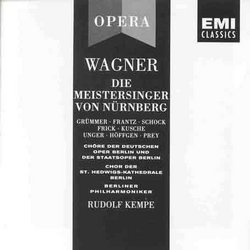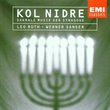| All Artists: Richard Wagner, Rudolf Kempe, Berliner Philharmonker, Ferdinand Frantz, Gottlieb Frick, Elisabeth Grummer, Rudolf Schock, Horst Wilhelm, Benno Kusche Title: Die Meistersinger Von Nurnberg Members Wishing: 0 Total Copies: 0 Label: EMI Records Release Date: 2/16/1993 Album Type: Import Genre: Classical Style: Opera & Classical Vocal Number of Discs: 4 SwapaCD Credits: 4 UPC: 077776415420 |
Search - Richard Wagner, Rudolf Kempe, Berliner Philharmonker :: Die Meistersinger Von Nurnberg
 | Richard Wagner, Rudolf Kempe, Berliner Philharmonker Die Meistersinger Von Nurnberg Genre: Classical
|
Larger Image |
CD DetailsSimilar CDs
|
CD ReviewsThe most life-affirming of operas. John Austin | Kangaroo Ground, Australia | 08/02/2003 (5 out of 5 stars) "Happy the browser who is considering the purchase of a recording of this opera! Few operas have such a life-affirming effect. Few conductors, moreover, have been more successful in transmitting it than Karajan (recorded live at Bayreuth in 1951) and Kempe recorded in Berlin in 1956. Do not be deterred by the age of the Berlin performance. Technically it was a good era for recording in Berlin. The gleam on the voices was well caught and the choral and orchestral sonorities have depth and sufficient brilliance. The opportunity to begin re-recording in stereo came when the project was half completed at the Berlin Wintergarten, but Kempe, as great a conductor as any for keeping all parts of a performance in perfect proportion, decided to complete what had been begun. And how splendidly it does begin! All the pomp and pride of the key of C Major is displayed. When the overture joins seamlessly to the opening chorale, the interior of St Katherine's Church and the folk of Nuremberg worshiping therein are as clearly evoked as they might be in "a painting by Master Dürer". Kempe had some favorite and experienced singers to undertake the leading roles. Ferdinand Frantz, who I saw in this part, was Kempe's favorite Sachs. He has a dark rich voice, distinctive and authoritative enough to be distinguished from the many other mastersingers, and not too elderly sounding to suggest that Eva would never consider being his second wife. Elisabeth Grümmer provides an Eva that has never been excelled in complete recordings of this opera. The rich gleaming timbre of her voice, her legato phrasing in the Quintet, and her trilling at the end of the Prize Song demonstrate almost every lesson in singing the mastersingers try to uphold. In this opera heavy with male voices, Magdalene is the only other female role. Magda Hoffgen copes well with this minor part, a part that lies uncomfortably low for a soprano and too high for a mezzo. Gerhard Unger provides his best-recorded performance as David, clearly projecting in voice and manner the amiable and loyal apprentice. It would be churlish to dismiss Rudolf Schock's Walther as less than first class, merely because that singer had considerable success elsewhere than in opera. If he seems more preoccupied with the vocal demands of the role and less able to impress as a contender for the prize of Eva in marriage, it must be remembered that few tenors succeed in this role and that the great Melchior never attempted it. Benno Kusche's Beckmesser comfortably steers a middle course between clowning and villainy. Gustav Neidlinger's rich bass adds to the vocal texture here and there, and the wonderful Gottlob Frick is clearly a father for Eva who has not yet lost a commanding ring to his voice. A luxury item is provided at the end of the cast list in the form of Hermann Prey as the night watchman. A synopsis in provided in English, German and French, but no libretto." EMI, PLEASE REISSUE THIS! Ralph J. Steinberg | New York, NY United States | 09/18/2006 (5 out of 5 stars) "I do not understand how this performance could be out of print. EMI, please make up for this error as soon as possible! Rudolf Kempe was one of the greatest conductors on EMI's roster; that they failed to renew his contract and allowed him to free-lance is surely one of the great blunders. Listen to this sparkling, heartfelt, and spirited account of Wagner's masterpiece and you will understand just how underrated Kempe was. If EMI doesnt plan to reissue this greatest of all "Meistersingers," maybe they at least can lease it to a label like Testament. For that matter, could some enterprising company finally issue Kempe's 1960 Bayreuth "Ring"? Having heard it again, I go back to my orignal opinion: The Solti is certainly the best stereo version and a great performance in its own right, the Krauss 1953 Bayreuth is perhaps more evenly cast in some roles, but I think Kempe's is marginally greater, for its subtlety and moving humanity. Anyway, folks, get out the word: KEMPE RULES!"
|

 Track Listings (16) - Disc #1
Track Listings (16) - Disc #1

